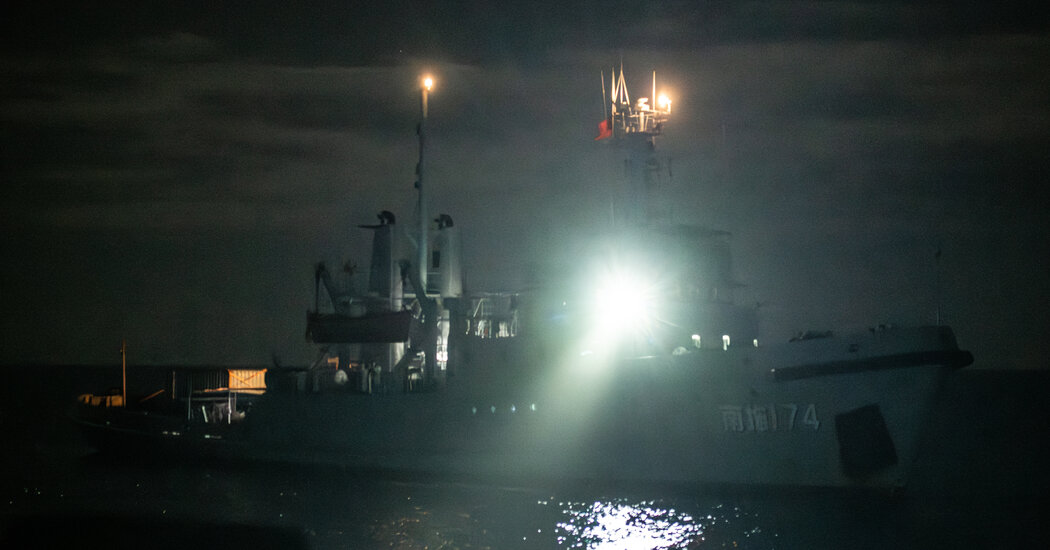How Chinese ships wall off the sea
This is what it looks like when a Chinese naval vessel bears down on your boat, as experienced firsthand by our reporters, who were on board a Philippine-flagged fishing vessel. They were reporting on how Beijing was imposing its territorial ambitions on the South China Sea.
More than 900 miles from the Chinese mainland, near the Philippine island of Palawan, the Chinese People’s Liberation Army, or P.L.A., has fortified an archipelago of forward operating bases. Beijing has branded these waters as China’s despite having no international legal grounding.
Over the radio, our reporters and the ship’s crew were told that they had intruded into Chinese territorial waters. The P.L.A. tugboat then repeatedly blasted its horn so loudly they could feel it in their bodies. With its floodlights nearly blinding them, the tugboat rushed their vessel, swiping within 20 meters of the much smaller boat in what maritime experts called a clear breach of international protocol.
These actions, though aggressive, stopped short of more extreme moves by Chinese naval craft in the region. Chinese coast guard and militia vessels have rammed, doused with water cannons and sunk civilian boats.
Context: The mounting Chinese military presence in waters that were long dominated by the U.S. fleet is sharpening the possibility of a showdown between superpowers at a moment when relations between them have greatly worsened. And as Beijing challenges a Western-driven security order that stood for nearly eight decades, regional countries are increasingly questioning the strength of the American commitment to the Pacific.
U.S. assisted Canada with investigating a Sikh leader’s killing
In the aftermath of the killing in June of the Sikh separatist leader Hardeep Singh Nijjar, U.S. intelligence agencies offered their Canadian counterparts context that helped Canada conclude that India had been involved.
Yet what appears to be the “smoking gun” — intercepted communications of Indian diplomats in Canada indicating involvement in the plot — was gathered by Canadian officials, Western allied officials said.
Uncertainty is “killing us,” said an Indian farmer who had hoped to explore business opportunities in Canada. Similar frustrations have been expressed by many Punjabis about the diplomatic war with Canada, which is home to the largest Sikh population outside India. Dreams have plunged into limbo as the Indian government has put visas to Canadian citizens on hold.
Ukraine steps up Black Sea shipping
Ukraine has increased its use of a new shipping route that has allowed it to begin reviving grain exports to circumvent a de facto Russian blockade of its Black Sea ports.
Two ships used the new route last week without incident, and three more cargo vessels have entered Ukrainian waters in recent days, according to officials.
Cash, mules and paid protests: The war in Ukraine has intensified longstanding frictions in the Russian-speaking Moldovan region of Gagauzia. Ilan Shor, a Moldovan fugitive convicted of plundering nearly $1 billion from his country’s central bank, has somehow seized control of the entire region.
THE LATEST NEWS
Asia Pacific
Seeking K-pop stardom while out and proud
Like many other South Korean singers, jiGook — who considers himself gender-fluid, transmale and nonbinary — wants to be a K-pop star. So do Prin and SEN, his bandmates in QI.X, a fledgling group that has released two singles.
What makes them unusual is that they are public about who they are in a conservative nation where many entertainers see coming out as L.G.B.T.Q. as a potential career killer. The members of QI.X call themselves one of the first openly queer, transgender K-pop acts, and their mission has as much to do with changing South Korean society as with making music.

